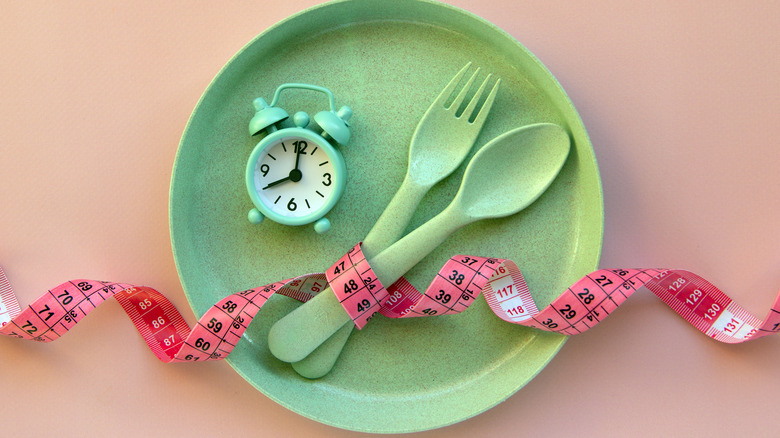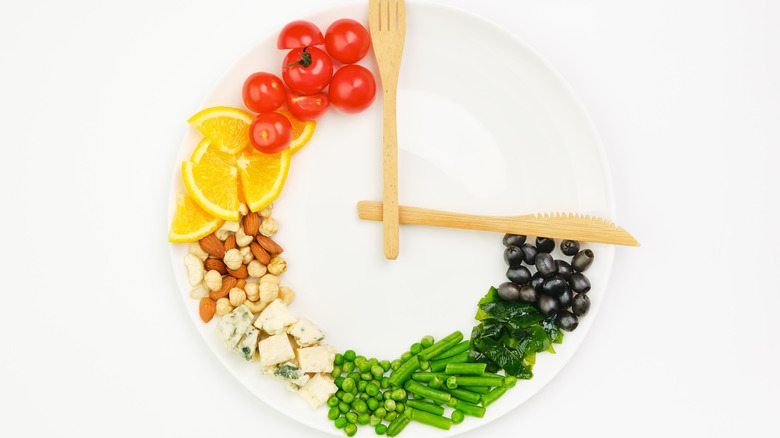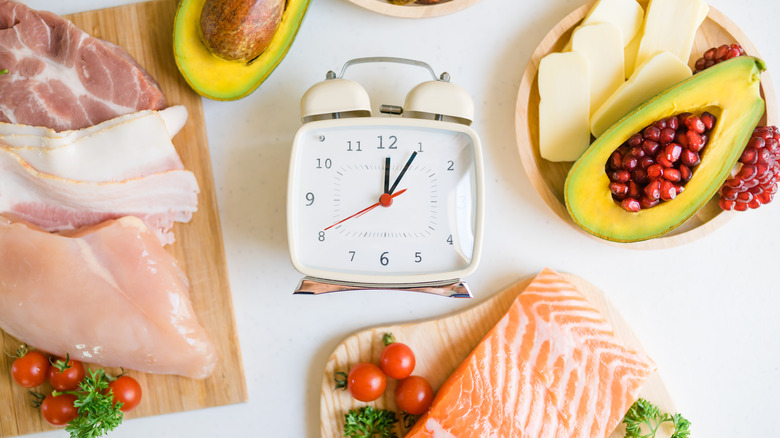How To Successfully Follow A Modified Keto Diet
Since time immemorial, fad diets have been adopted by people who wish to shed extra inches. Think the ridiculous baby food diet, the Master Cleanse, and the so-called Fletcherism diet — all these have gone viral as they promise to help one successfully lose weight by either eating or restricting certain foods, oftentimes both.
But if there's a popular diet that has stood the test of time and broken its fad stereotype, it's the ketogenic diet or "keto" diet. To the uninitiated, the Harvard School of Public Health notes that the keto diet dates back to the 1920s when it was recommended as a treatment for children diagnosed with epilepsy. It consists of eating meals that are low in carbohydrates but fat-rich, with fat being as high as 75% of your food intake. While some protein is allowed, the whole point of the diet is to force the body to burn fat instead of carbohydrates for energy.
The keto diet is definitely restrictive, which is why people tend to shy away from it. While calories are not an issue, the selection of food you can consume is significantly smaller, which can lead to nutrient deficiencies. The good news is there's a way to go on a keto diet without depriving yourself too much. There's a thing called the modified keto diet, which is less restrictive than traditional keto.
Modified keto in a nutshell
Unlike the traditional ketogenic diet, modified keto, also sometimes referred to as Keto 2.0, is less reliant on fat. If the fat content of meals in traditional keto should be up to 75%, the fat composition in modified keto could be in the neighborhood of 50 to 65%. With this rule, this alternative take on keto can still offer many of the same benefits as the traditional version, but registered dietician Andrew Ossa tells U.S. News that you may not produce as many ketones, the chemical produced by the liver to break down fats.
The benefits of doing modified keto
The problem with restrictive diets is that people tend to give up on them right away because they take the joy out of eating. The whole point of doing modified keto is to make the keto diet more sustainable for a person who can't commit as much. Its main benefit is having more flexibility with what you put in your body. You can dine out more at restaurants and allow yourself to eat in social settings. You can even let yourself indulge in your cravings, albeit occasionally. In short, the modified keto is less a stickler for rules than its traditional counterpart, allowing you to have a more balanced diet.
Foods you can eat while on modified keto
You may not know it, but if you're on a low-carb diet, you're probably already doing modified keto anyway. Brett Osborn, author of "Get Serious: A Neurosurgeon's Guide to Optimal Health and Fitness," tells Men's Journal that at its core, it's really just about "healthy living." That means introducing more lean proteins, fruits, and vegetables into your diet to get the nutrients you need to stay healthy. Think salmon, tofu, lean beef, chicken thighs, and whole eggs. And while eating more carbohydrates is encouraged, that doesn't mean you should rely on rice, pasta, and bread. Instead, eat more beans, seeds, nuts, berries, whole grains, and legumes.
Consider keeping a food diary
Keeping a close eye on what you eat in a day can be tough, especially if you're following a diet like the modified keto. To ensure that you're on the right track, you may want to keep a food diary to document what you eat in a day. Doing so gives you a chance to visualize your eating patterns, which would then allow you to pinpoint what needs to be changed. Just be sure to also make a note of not just what you're eating but how much you're eating, too. Remember that portion control is important in modified keto, and tracking the measurements of your food lets you know if you're indeed consuming what you're supposed to.
Modified keto and weight loss
Now onto the crucial question: Can you still lose weight while on modified keto? Yes, but not as quickly. However, if long-term health is your goal, it may still be a solid option.
Scott Keatley, R.D., of Keatley Medical Nutrition Therapy, tells Prevention that the diet is a good way to shift to more nutritious foods. "It's not that carbs are bad, it's that we as Americans are consuming too many high-calorie carbs such as potatoes, bananas, rice, pasta, and other refined grains," he said. "Shifting the keto diet away from fat and towards non-starchy fruits and vegetables is a great way to improve fiber intake, which can help you feel fuller longer, improve gut health, and help prevent some cancers."





